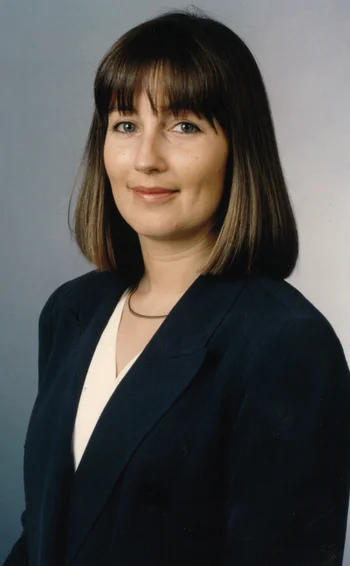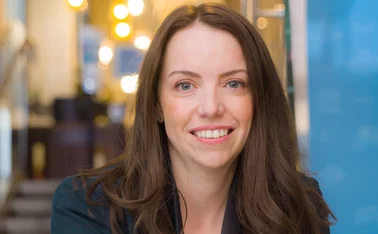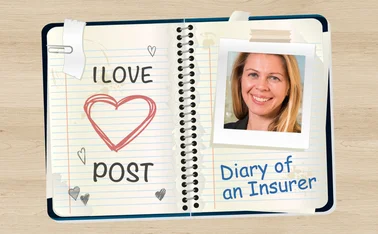
180 Years of Post - The history of direct insurance in the UK: How Direct Line and Churchill took on the establishment and ended up as merger partners
As Post celebrates 180 years, Post content director Jonathan Swift explores the birth of direct insurance in the UK and how two key early movers Direct Line and Churchill went from rivals to merger bedfellows in a deal that literally 'shook up insurance'.
Quinton also decided the time was right for him to move on from a business he had joined in 1983 as a graduate trainee accountant because it was offering twice as much money (£7,500) than chartered accountancy firms.
“When I sold the Prudential business I just wanted out as [my time there] had run its course and it was an opportunity to go. [Then Prudential UK and European CEO] Mark Wood asked me to stay and offered me some roles, but I replied that I would take my chances. Partly because I wanted to move on; and secondly it felt wrong to sell 1,300 people down the river and then not stay. It would be like the Ricky Gervais [as David Brent] moment [in the TV series The Office] where he says ‘there is good news and bad news’. The good news being I am moving on and have been promoted.”
Churchill wasn’t just adding volume through buys though, it was also making a name for itself in the affinity and partnership space as Geoff Carter remembers: “I was at a company called United Friendly that Churchill bought. And as part of that acquisition I had met [then business development director] David Hiddlestone and John O’Roarke and they said they were not sure what the job was, but would I come in and join them. They were about to launch the Nationwide relationship [on household] and asked if I would project manage that. So I became partnerships director and we did Lloyds Bank, Alliance & Leicester, Nationwide motor … tons of them”.
Reflecting on what it was like to be at Direct Line at this time Selwyn Fernandes says: “From my perspective, it felt Direct Line was the clear market leader in the direct to consumer distribution for personal lines, both in terms of scale and profitability. But even though Direct Line had a joint venture with Tesco, Churchill was much stronger and more successful in building its direct partnership distribution. I experienced this personally when Direct Line lost out to Churchill’s bid, while working as part of the bid team for the Prudential business.”
International expansion
One line of expansion being pursued by Direct Line that was not on the Churchill radar was international.
Direct Line launched a Spanish joint venture with Bankinter in 1994, Linea Directa, a stakeholding that it had to sell in 2009 for €426m (£375m), after its partner exercised a clause giving either the right to buy the other's share should a third party take control of either of them. That clause came into effect when the British Government bought took control of RBS. At that point Linea Directa had 1.6 million policyholders.
In 2001, Direct Line acquired the Italian and German motor insurance operation of US insurance company Allstate. This combined with the purchase of RSA's direct motor operation in Italy in 2002, made Direct Line Italy’s largest direct motor insurer, according to the insurer. These German and Italian arms were sold to Mapfre in September 2014 for €550m.
The question of how far the red phone’s cable could be stretched even saw an ill-fated attempt by RBS to launch in Japan [launched in 1999 and closed in 2004] and for Wood to license the brand icon as part of a US joint venture with Morgan Stanley and Plymouth Rock founder and president James Stone called Direct Response [in 1993], which was sold to Unitrin in February 2009.
Graham was involved in this joint venture and says: “I turned up there as employee number three in White Plains, New York, with a telephone directory and was told ‘go on son, get us operational within a year’. And I thought this will be easy, everyone knows Direct Line. But when I started recruiting people they didn’t even know where the UK was, let alone what Direct Line is.”
The red phone on wheels was also potentially seen as a sticking point despite a thawing in US-Russian relations. “It ran into some issues because the connotation of a red phone in the US is the hotline to the Kremlin, so there was some discussion as to whether it was a suitable brand icon or not. But it was used in the end,” Graham comments.
The culture shock that Graham experienced trying to launch Direct Response in the US was also experienced by those who came to work at both Direct Line and Churchill. Especially those used to working for more traditional insurance businesses until then.
Batabyal comments: “[Direct Line] was very different and if someone wanted to do something there were fairly short lines of communication to get to Peter [Wood] as the main decision maker. If he said yes, we did it, if he said no we didn’t. There weren’t lots of committees and it did not take ages to make decisions.”
Fernandes adds: “I joined Direct Line in 1993, just as it reached one million motor policies. I previously worked for British Rail as a graduate operational analyst, and was looking for a more dynamic, empowered environment. I never considered joining the insurance industry before, but the role offered me a chance to apply my skills and experience to effect change, as the organisation was very flat in terms of hierarchy at the time.
“My personal highlight was being influential in shaping the business, regardless of status, and then being promoted – relatively rapidly – to a senior management role based on merit. There were also numerous career development opportunities on offer.”
Different cultures
Emma Banks began her career at Churchill in 1992 and then joined Direct Line eight years later. “They both had great cultures, but from what I saw Direct Line felt a bit more entrepreneurial at the time,” she reminisces. “People just got their heads down and did their jobs and it was a massive brand, but one where you could make a difference. I would describe Churchill as more paternalistic when I was there.”
Despite its rapid growth Graham agrees that Direct Line also still had a “can do yesterday culture” and empowered staff when he worked there.
“Nothing happened at Direct Line without IT being involved; so [my department] was an integral part of the entire business. So anytime anything new was coming along you were involved in it and that helped you to get a better understanding of how the whole organisation operated,” he continues.
“We were constantly changing so the juggling act was that there was always something new that was super urgent and had to be done. It was never a case of ‘oh well, we understand these things take time’. It was ‘bang, bang, bang, keep churning it out sunshine’. The IT group was under pressure, but not as if you felt your job was on the line; it felt that you were part of something and you went the extra mile because it was great being part of something that was going places.”
And this ‘can do’ and ‘empowered’ culture came from the top, with one former staff member recalling: “Peter Wood was very good with the staff; he was idolised as a role model because people were happy to work for something successful and he was the man who started it all.”

Across South London in Bromley, Blowers describes working at Churchill as “very relaxed and fluid” adding that this extended to the very top here too: “[Churchill chairman and CEO] Martin [Long] wasn’t one for holding long tortuous meetings and at one stage there was even a suggestion of putting swipe cards on the doors to the meetings rooms with a meter to clock up the hours that people spent in them.”
One idea that did see the light of day was the issuance of SYNN [Say Yes, Not No] cards to Churchill employees.
“Martin brought up this initiative that said it was OK to SYNN,” Crawford explains. “So all the front line staff were empowered so that they could make a decision as long as it gave a customer the right outcome. And it must be remembered that this was before compliance, before the degree of regulation [we see now]. We were regulated by the Bank of England. The concept of what we know as conduct today; regulation and compliance, it just didn’t exist. Martin bought all this stuff in because he believed it was the right thing to do.”
And like his former colleague Wood at Direct Line, Long is still fondly remembered today as he was in the eighties and nineties.
“I joined Churchill in 1990 about 12 months after the business was founded,” O’Roarke reflects. “I wasn’t initially attracted to the business – in fact I’d never heard of it when I joined – but I was absolutely sold on it once I met Martin Long, who was – and still is – the most inspirational leader I’ve ever met."
Andy Webb, who was recruited a decade later in 2000 from British Gas, recounts: “I have never met anyone like him. So much of what I am and who I am in my job, have come from Churchill. My expectation of what I want from a leader has come from Martin Long. Martin was paternal, irreverent and uncompromising. Don’t get me wrong he could be prickly and stubborn but I reported directly to him and my one-to-ones with him were hilarious. His PA would ring mine and I would be summoned to the top floor which always smelt of lilies and I’d go to his office and he’d have two questions: ‘What are you doing to look after my people?’ and ‘what are you doing to look after my customers?’.
“That would be it, other than he would remind me ‘… and they are my people’. So I’d tell him what I was doing and then as I left his office, I’d turnaround and add ‘… and they are my people now’. He appreciated that I took this all as seriously as he did and he trusted me to get on with it.”
Long was known for shooting from the hip, especially on Friday afternoons when he’d often sign off for the weekend with what one former colleague called the “… and another thing” emails.
“The recruitment of [operations manager] Robin Reames and a raft of ex-military people stemmed from one of these,” comments Blowers, who himself had worked in the army. “He had got to page 196 of a Jack Welch book which recommended recruiting loads of ex-military people and so he contacted me and said ‘you know something about the army, go and recruit me lots of ex-army people’. So I phoned John [O’Roarke] up and he said, ‘It’s Friday afternoon, don’t worry he’d have forgotten by Monday’. But come next week he phoned me up and asked: ‘How are you getting along recruiting these ex-army people?’ So we got some and they were a God send to Churchill.”
Forced fun
Despite this focus on culture and the Churchill values, there was a sense from some of those who joined Churchill later that the ethos might be described as sometimes bordering on “forced fun”. It was no coincidence that one of the H’s stood for ‘humour’.
“If you did not like dressing up in fancy dress, you were going to become quite uncomfortable,” Carter says. “There was the hardcore who had been there a long time; and I was just on the outside of that. Was it forced fun? You would not have enjoyed it if you did not like having the piss taken out of you, or fancy dress, or a quite lively Christmas party.”
Just turning up with something you bought down the High Street at Woolworths would not have worked Carter continues. “You had to really go for it and Martin [Long] would do a grand procession tour round the entire business to judge it. If you did not like dressing up my advice would be to take the day off. But it was fantastic if you were in on the joke.”

Someone else described Churchill as a business run on “a combination of Budweiser and Margaux Bordeaux depending where you were in the organisation”. However, this cocktail did sometimes comes with a downside as evidenced by two now legendary stories concerning the Churchill Teeside office party.
The first saw a member of the senior management team who woke up late the morning after punished for their tardiness. Their colleagues waited until they were within touching distance of the London bound private jet before greenlighting it take off leaving the over-sleeper standing on the runway ruminating how they were now going to get back to Bromley.
On another occasion one of the guests at the venue – not with Churchill – had landed their helicopter in the hotel grounds, which proved to be too irresistible for an amorous couple of employees who proceeded to “virtually write-off” the vehicle when their courtship resulted in high heels causing extensive damage to the roof and dashboard.
“I thought it was an urban myth until I started,” says Carter [who operationally managed the centre]. “And then I got the bill. And when I asked John [O’Roarke] about it, he said you have got the bill – but we had to negotiate how much of the damage we’d pay.”
Speaking of trysts by 2002, the whispers that Churchill could be for sale and that Direct Line was a likely suitor had started to get louder. And although O'Roarke stressed it was "business as usual," to Post, speculation was mounting that ultimate parent Credit Suisse could be forced to sell off all or part of its Winterthur Insurance business due to shareholder pressure.
And the insurer notably changed its tone between August 2002 and March 2003 when it was asked a question about its future.
In the first instance it responded: "Credit Suisse has made it explicitly clear to us that nothing is up for sale. Our goal is to be the third largest general insurance company in the UK in the not-too-distant future, which we intend to achieve through acquisitions and organic growth and we will continue with the full support of Credit Suisse."
Seven months later the same question elicited: "We cannot comment on market speculation and rumour."

Bill Miller, who had helped integrate Green Flag and the RSA Italian book into Direct Line beforehand, remembers: “I was with Annette Court and she told me she had just had a fax come through from [RBS group CEO] Fred Goodwin [with an ultimatum from Credit Suisse and Winterthur] saying if we wanted Churchill and NIG for £1.2bn we had a certain number of days to do the deal. So I started to get involved and looking at what we could do in terms of due diligence.”
Unlike other deals he had worked on Miller comments that the potential Churchill and Direct Line one was hampered by the lack of ‘middlemen’ whose job it was to know both sides, give advice, but share classified information. He also joked NIG lived up to its ‘Not In Group’ moniker when it came to gathering information. However, he quickly concluded that while there was some overlap, “it wasn’t that significant” especially in areas like partnerships or on the intermediary side.
“It was a no brainer, and we set some initial targets in terms of what we could deliver, what we could produce and what the shape of the performance would be over the next few years allowing for the fact there would be a certain number of people who might leave,” Miller continues.
“It quickly became apparent because Direct Line had been after Churchill for some time that this was going to be a one-off opportunity, if it did not do it, someone else would.
“Credit Suisse had also come to the opinion that the best suitor [for Churchill] was Direct Line/RBS because it had the money and when you knocked them together there would be significant synergy benefits and [in motor] it created, if not a dominant position, a business with 25% to 30% of the market.”
O’Roarke agrees with Miller’s ‘no brainer’ assessment. “There was a compelling logic – Churchill was a competitive ‘thorn in the side’ of Direct Line and Fred Goodwin had approached our owners Credit Suisse on several occasions to ‘take us out’.
“The attraction to RBS was market dominance – the combined business would insure 8.5 million cars.”
Only users who have a paid subscription or are part of a corporate subscription are able to print or copy content.
To access these options, along with all other subscription benefits, please contact info@postonline.co.uk or view our subscription options here: https://subscriptions.postonline.co.uk/subscribe
You are currently unable to print this content. Please contact info@postonline.co.uk to find out more.
You are currently unable to copy this content. Please contact info@postonline.co.uk to find out more.
Copyright Infopro Digital Limited. All rights reserved.
As outlined in our terms and conditions, https://www.infopro-digital.com/terms-and-conditions/subscriptions/ (point 2.4), printing is limited to a single copy.
If you would like to purchase additional rights please email info@postonline.co.uk
Copyright Infopro Digital Limited. All rights reserved.
You may share this content using our article tools. As outlined in our terms and conditions, https://www.infopro-digital.com/terms-and-conditions/subscriptions/ (clause 2.4), an Authorised User may only make one copy of the materials for their own personal use. You must also comply with the restrictions in clause 2.5.
If you would like to purchase additional rights please email info@postonline.co.uk








